The school that relocated 200 miles to the Ceredigion seaside
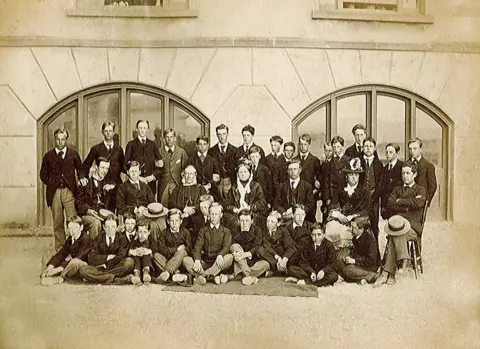 Uppingham School
Uppingham SchoolThe seaside village of Borth is probably best known for its three-mile long sandy beach, the longest in Ceredigion.
What is lesser known is its unlikely bond with a public school in the midlands.
A bond that was created in 1876 and endures to this day.
Ravaged by typhoid from unsanitary water supplies, Uppingham, a boarding school in Rutland in the east midlands, had to relocate its 300 students.
So it moved them 200 miles (321 km) away to a hotel in Borth for a year.
Despite some initial hostility from locals, the partnership proved fruitful for both parties, when the boys helped defend the village from a flood in 1877.
It is commemorated each year with a service at Uppingham School's chapel as well as in the name of the pitches at Borth's Sports Centre, which are called Uppingham Fields.
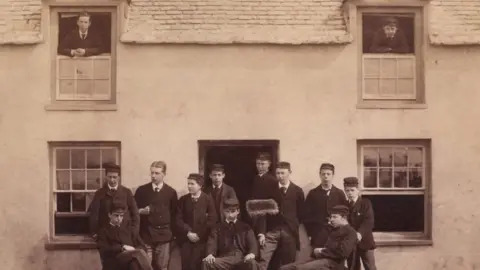 Uppingham School
Uppingham SchoolIn June 1875, an Uppingham student died from typhoid.
It was hoped it was an isolated incident and that the upcoming summer holidays would act as a "circuit breaker" against further infection.
However, on resumption of the autumn term, there were another 47 cases, and four more boys lost their lives.
This caused Uppingham headmaster Edward Thring to send everyone home in November.
"When Thring had taken charge of the school in 1853, it had comprised just 43 pupils, including 18 day-boys," said former Uppingham history teacher Dr Nigel Richardson.
"By 1875 there were 300 students, increasing the town's population by 10% and putting a massive strain on their sanitary provisions."
Dr Richardson, who wrote A Spring Invasion of Uppingham School at Borth, said of 12 school drinking wells, 11 were close to and contaminated by sewage.
The school's current archivist, Jerry Rudman, explained that the evacuation was more than just a humanitarian exercise.
"There was a degree of poker-playing and brinkmanship to the decision to move away," he said.
"Obviously there was the health aspect, but also the school was run as a consortium of independently run boarding houses - effectively hotels. Each were their own separate businesses, all of which would have failed had the school gone under."
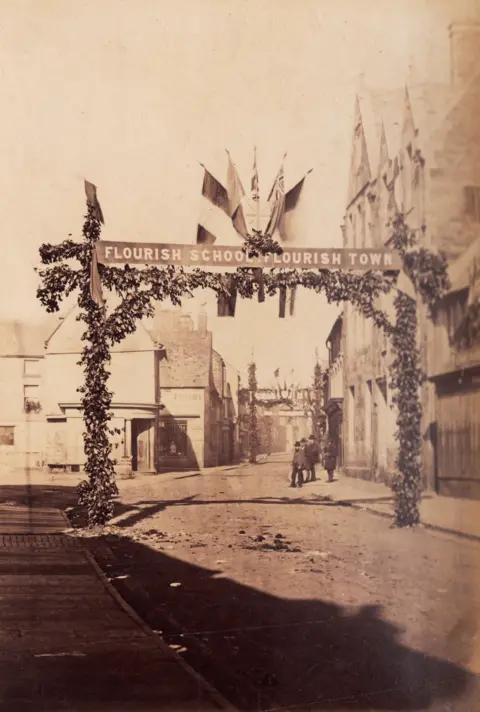 Uppingham School
Uppingham SchoolMr Rudman described Mr Thring as "a performer, a man whose gestures were meant to be seen by the wider world".
"By taking the boys out of Uppingham he knew that he was playing his joker," he said.
"He was crippling the local economy - the butcher, the baker, the candlestick-maker all relied on the school for their livelihoods, despite the fact that it was their increased rates which would have to pay for the necessary sewage improvements."
So in April 1876, a chartered train of 18 carriages took away the entire contents of Uppingham School - desks, beds, wardrobes, even their massive horse-drawn cricket roller.
House masters had been sent out around the UK in search of the perfect location for the evacuation - Thring himself was thought to have favoured the Lake District.
But a Mr Cobb stumbled across Borth when a scouting mission to Llandrindod Wells had proved fruitless.
The Great Western Railway had overestimated the appeal of this isolated fishing village when they built the 120-room Cambrian Hotel on the street of the newly-created Borth Railway Station.
A rate of £1 per-room-per-week was agreed for the more-or-less empty hotel, and a further 27 fishermen's cottages were also taken on.
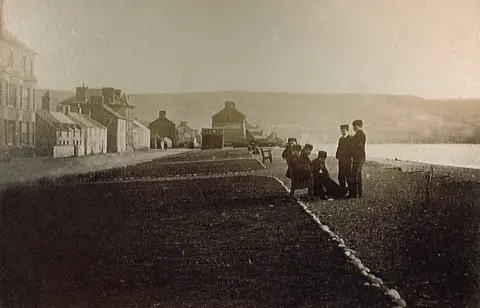 Uppingham School
Uppingham School"In the very early days some of the Borth women complained about the boys' very demonstrative gestures, but I really think that was just the language barrier," said Dr Richardson.
"You have to bear in mind that at this stage Borth was a predominantly Welsh-speaking area, and these were just fairly privileged boys trying to make themselves understood in a world which didn't understand them."
Thring encouraged pupils to take responsibility for themselves - even rewarding a pair of boys who had gone out exploring for octopus, even though they had been cut off by the tide and marooned on a rock.
Relations began to improve when the Uppingham pupils used their cricket roller over a field near Bow Street, making it fit to host cricket and football matches for the first time.
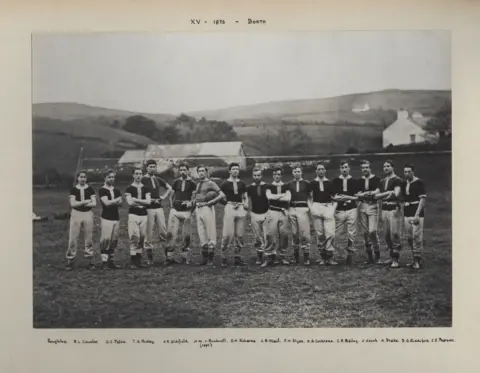 Uppingham School
Uppingham SchoolDuring the 1876-77 season, the boys won a number of cricket and football matches that were acclaimed as upholding Borth's reputation.
They cemented their place in the hearts of locals further after defending the village from a storm in January 1877.
After gathering mud, stones and twigs, they created their own coastal defences.
By the end of the year, drainage improvements had been made in Uppingham, and the school moved back home.
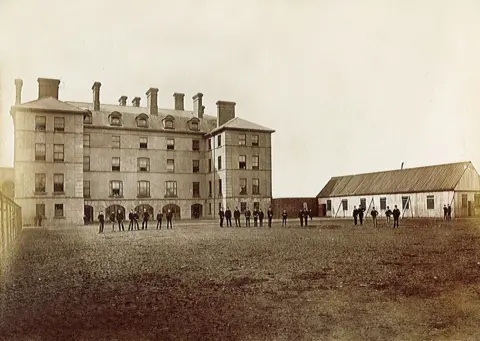 Uppingham School
Uppingham SchoolThe farewell speeches were described as heartfelt by both locals and school teachers.
A stained glass window was given to the church in Borth in the 1920s by Uppingham old boys.
There is also a stone bench outside to commemorate the relationship, and in 1977, the playing fields in Borth were renamed Uppingham Fields to mark the centenary of their stay.
